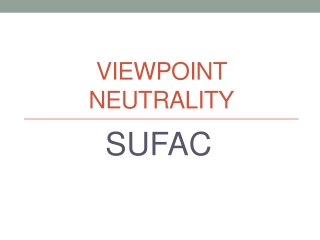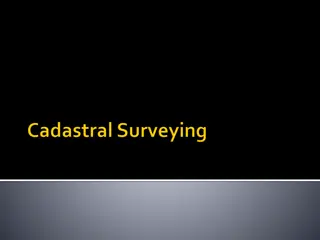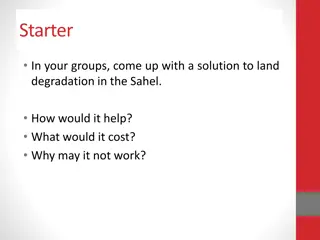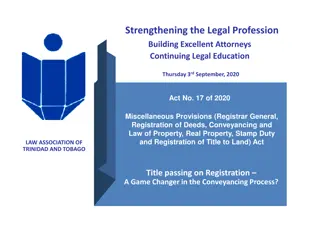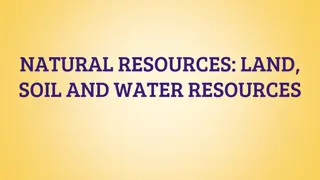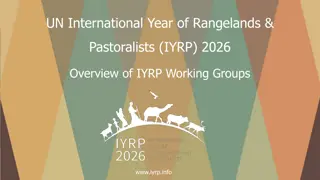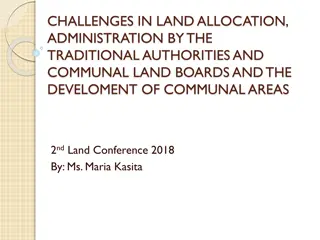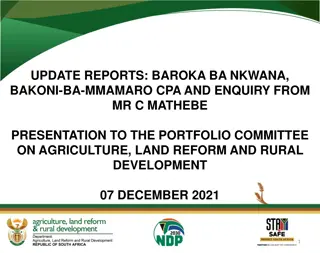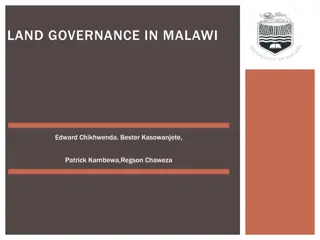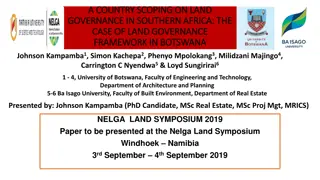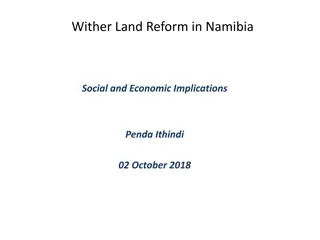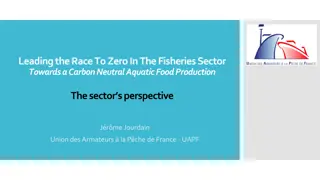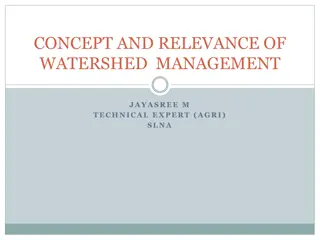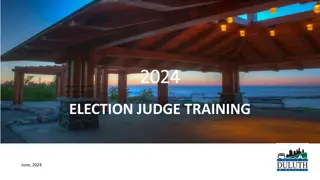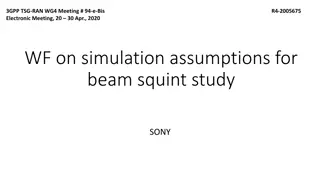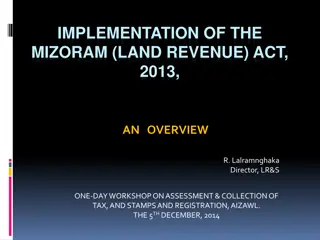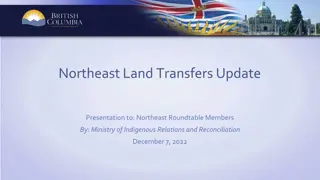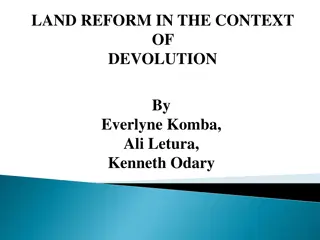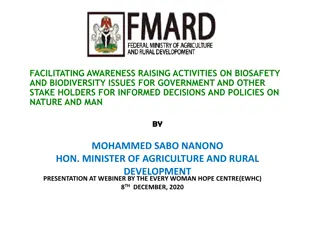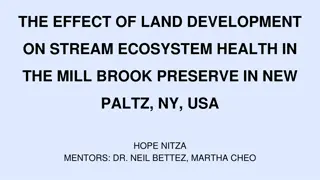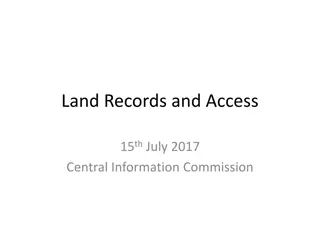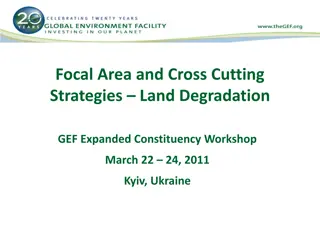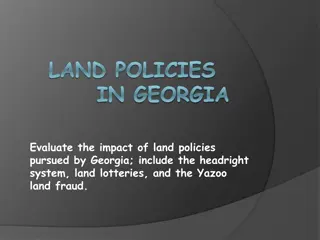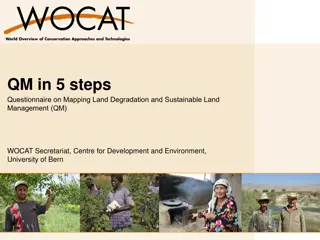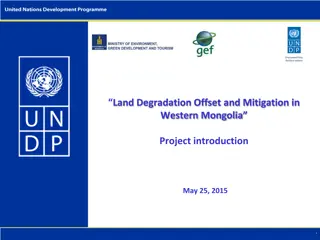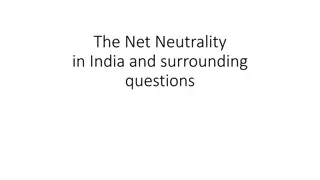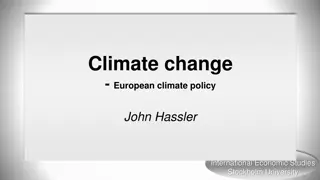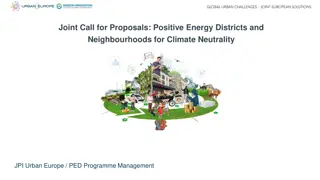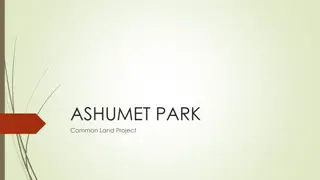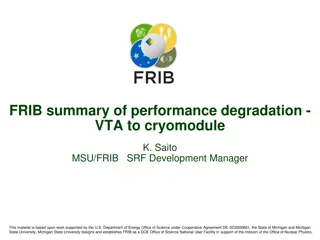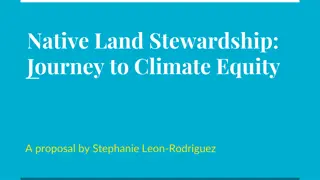Understanding Viewpoint Neutrality in Student Fee Allocations
Explore the concept of viewpoint neutrality in student fee allocations, focusing on the U.S. Supreme Court's decision in Southworth v. Board of Regents. Learn about the constitutional mandate for public institutions to remain neutral in funding decisions and the history behind the Southworth case. D
3 views • 32 slides
Understanding Climate Neutrality and Roadmaps for Achieving it at a University
Exploring the concept of climate neutrality and the development of roadmaps to achieve it at a university, focusing on the efforts of JKU and its Energy Institute towards CO2 reduction and reaching climate neutrality by 2030. The roadmap involves stakeholder engagement, defining system boundaries, u
1 views • 19 slides
Ireland's Neutrality in World War II
Despite being divided into North and South, with Northern Ireland part of the UK, the Free State of Ireland remained neutral during World War II. Eamon DeValera, leader of Fianna Fail, chose neutrality, which impacted Ireland's relationship with both the Allies and the Axis powers. Learn more about
6 views • 9 slides
Understanding Cadastral Systems in Land Management
Cadastral systems play a crucial role in land management by handling land registration, property taxation, and land tenure. These systems involve private conveyancing, registration of deeds, cadastral surveying, and mapping to maintain records efficiently. They provide information on parcel index ma
1 views • 16 slides
Understanding Pharmaceutical Degradation: Types and Factors
Pharmaceutical degradation refers to the process of a formulation in a specific container losing its chemical, microbiological, therapeutic, physical, and toxicological specifications. It can be categorized into physical, chemical, and microbiological degradation. Physical degradation alters the dru
1 views • 50 slides
Solutions to Combat Land Degradation in the Sahel Region
Addressing land degradation in the Sahel through solutions like diguettes, managing grazing areas, and farmer education can help increase crop yields, prevent soil erosion, and promote sustainable land management. While these solutions have proven effective in various regions, challenges such as ini
1 views • 23 slides
Evolution of Land Law Systems in Trinidad and Tobago
Trinidad and Tobago's land law systems consist of the Common Law System and the Registered Land System. The Common Law system governs unregistered land where title passes upon execution and delivery of the deed. In contrast, the Registered Land System confers ownership upon registration and offers c
0 views • 28 slides
Understanding Polymer Degradation Processes in Chemistry
Polymer degradation involves a reduction in molecular weight due to various factors like heating, mechanical stresses, radiation, oxygen, and moisture. Two main types of degradation include chain end degradation and random degradation, each affecting the polymer structure differently. Chain end degr
0 views • 12 slides
Understanding Land, Soil, and Water Resources
Natural resources such as land, soil, and water are crucial for human activities. Land comprises the lithosphere and is utilized for various purposes based on land use patterns. The study of land use patterns is essential for economic planning, as the availability of land is limited, leading to conf
5 views • 25 slides
UN International Year of Rangelands & Pastoralists 2026: Working Group Overview
The UN International Year of Rangelands & Pastoralists (IYRP) 2026 initiative aims to raise awareness about the contributions of rangelands and pastoralists to food security, economy, environment, and cultural heritage. The Working Groups focus on various themes such as afforestation, mountain pasto
0 views • 12 slides
Challenges in Land Allocation and Administration by Traditional Authorities and Communal Land Boards
The Communal Land Reform Act of 2002 introduced Communal Land Boards to assist Traditional Authorities in land administration. However, challenges such as misconceptions of powers, limited technical capacity, inadequate resources, and unclear procedures have hindered smooth registration and resoluti
0 views • 15 slides
Update Reports: Baroka Ba Nkwana, Bakoni-Ba-Mmamaro CPA, and Enquiry from Mr. C. Mathebe Presentation to the Portfolio Committee on Agriculture, Land Reform, and Rural Development
This report provides updates to the Portfolio Committee on Agriculture, Land Reform, and Rural Development regarding Mr. Collen Mathebe's matter, Bakoni-Ba-Mmamaro CPA, and Baroka Ba Nkwana Land Claim. Mr. Mathebe's issue cannot be resolved through the Land Title Adjustment Act, and alternative opti
0 views • 38 slides
Land Governance in Malawi: Challenges and Progress
Malawi's land governance system has evolved significantly since the colonial era, with a framework that includes institutional and legal aspects. The country has faced challenges in managing land disputes, valuation, taxation, and public land use. The institutional setup involves the central governm
0 views • 23 slides
Land Governance Framework in Botswana: A Country Scoping Study
Botswana, a landlocked middle-income country in Southern Africa, faces challenges such as high population growth, unemployment, poverty, and a less skilled workforce. This study examines the land governance framework in Botswana, focusing on key challenges in land administration, dispute resolution,
0 views • 15 slides
Implications of Land Reform in Namibia: Social and Economic Insight
Land reform in Namibia is crucial for inclusive growth and shared prosperity, with access to land being a key factor. Productive land usage can lead to wealth creation and social development. The importance of agriculture in the economy is highlighted, along with the need for skilled farmers and a s
0 views • 7 slides
Enhancing Land Degradation Neutrality Targets in Lebanon's National Action Programme
Integrating LDN targets into Lebanon's National Action Programme, led by Dr. Chadi Mohanna, aims to align the NAP with the UNCCD's 10-Year Strategy, set national targets for Land Degradation Neutrality, and implement measures to combat land degradation aggravated by climate change. The project focus
0 views • 23 slides
Maintaining Neutrality as a Facilitator in Collaborative Meetings
When a facilitator maintains neutrality in collaborative meetings, it allows all voices to be heard, encourages collective intelligence, and fosters fairness and inclusivity. Developing neutrality involves self-reflection, seeking diverse perspectives, questioning assumptions, and practicing empathy
0 views • 16 slides
Advancing Towards Carbon Neutrality in the EU Fisheries Sector
The EU fisheries sector is making strides towards carbon neutrality, with a focus on reducing greenhouse gas emissions and adopting energy-efficient technologies. Efforts include decreasing CO2 emissions from fishing fleets, implementing regulations for vessel capacity, and exploring innovative equi
0 views • 13 slides
Urgency of Watershed Management for Sustainable Agriculture
Watershed management is crucial due to dwindling land availability, water scarcity projections, and the severe threat of soil erosion and land degradation. With vast regions affected by these issues, especially in rainfed areas, there is a pressing need to address resource degradation to ensure food
0 views • 50 slides
Understanding Net Neutrality in a Digital Economy: A Comprehensive Analysis
Explore the concept of net neutrality in the digital economy through an in-depth analysis of how ISPs discriminate, the Jamaican example, arguments for and against, and key issues surrounding online equality and regulation.
0 views • 14 slides
2024 Election Judge Training: Code of Conduct, Neutrality, and Polling Place Setup
Explore the essentials of election judge training for the 2024 elections, covering the code of conduct, maintaining neutrality in the polling place, and details on polling place setup and roles. Understand the oath, duties, and responsibilities of an election judge, emphasizing impartiality, profess
0 views • 55 slides
Simulation Assumptions and Performance Degradation Study on Beam Squint in 3GPP Meeting
Background on beam squint in conducted power of transmitted CCs causing radiative domain impairment and gain droop, with a problem statement on degradation of CC2 spherical coverage when CC1 and CC2 are separated by frequency. The study involves refined simulation assumptions to quantify radiative d
0 views • 7 slides
Overview of the Mizoram Land Revenue Act, 2013
The Mizoram Land Revenue Act, 2013 replaced several previous regulations and came into effect on June 1, 2013. It establishes authorities for land management, outlines control and powers over land, and provides guidelines for land allotment for specific purposes. The Act designates the Government of
0 views • 18 slides
Update on Northeast Land Transfers: Presentation to Roundtable Members
Ministry of Indigenous Relations and Reconciliation provided an update on land transfers in Northeastern British Columbia, focusing on Treaty Land Entitlement, stakeholder engagement, and communication methods. The presentation highlighted the historical land debt, final settlement agreements, and t
0 views • 8 slides
Land Reform in the Context of Devolution in Kenya
Kenya, with a land area of 582,646 sq. Km, has undergone land reform in the context of devolution since gaining independence in 1963. The country's adoption of the Constitution in 2010 led to the establishment of a system with 1 national government and 47 devolved governments. Kajiado County, inhabi
0 views • 33 slides
Addressing Land Degradation Challenges in Agriculture for Sustainable Development
World agriculture has evolved over the decades, facing challenges like environmental degradation and land misuse. Awareness-raising activities on biosafety and biodiversity are crucial for informed decision-making in agriculture. Nigeria, with its diverse ecological zones, must sustainably manage na
0 views • 13 slides
Impact of Land Development on Stream Ecosystem Health in Mill Brook Preserve, NY, USA
The study focuses on the effects of land development on stream ecosystem health in the Mill Brook Preserve in New Paltz, NY. It discusses the degradation of water quality due to surrounding land development and the importance of macroinvertebrates as indicators of ecosystem health. The review of lit
0 views • 23 slides
Importance of Land Records in Preventing Land Disputes
Land records play a crucial role in documenting ownership, facilitating land-related transactions, and preventing costly litigation. They serve as a lifeline for effective governance and provide legal status to landowners, ensuring clarity and transparency in land ownership. Without proper land reco
0 views • 15 slides
Achievements and Strategies in Land Degradation Management
The Global Environment Facility (GEF) has made significant investments in sustainable land management, particularly in drylands, to combat land degradation through projects in over 40 countries. The objectives include maintaining agro-ecosystem services, generating sustainable forest ecosystem servi
0 views • 10 slides
Understanding Land Use Management and Its Impact on Fertility
Humans have utilized land for various needs over time, evolving from agriculture to encompass municipal, transportation, energy, recreational, and waste management. Land use management is crucial for maintaining soil fertility and preventing erosion and pollution. Factors affecting soil/land fertili
0 views • 10 slides
Impact of Land Policies in Georgia: Headright System, Land Lotteries, and Yazoo Land Fraud
Georgia pursued various land policies post-Revolutionary War to allocate land obtained from Native Americans. The headright system granted land to soldiers and white men, aiming to boost population and state power. Land lotteries distributed land through random draws. The Yazoo land fraud scandal ta
0 views • 20 slides
5 Steps Questionnaire on Mapping Land Degradation and Sustainable Land Management
Preparation for mapping land degradation and sustainable land management involves steps such as preparing the base map, identifying contributing specialists, assessing land use systems, understanding land degradation types, and providing expert recommendations. The process includes analyzing area tr
0 views • 32 slides
Land Degradation Offset and Mitigation in Western Mongolia Project Overview
This project in Western Mongolia aims to address land degradation issues caused by mining activities by implementing offsetting principles, supporting pasture restoration, and enhancing biodiversity conservation. With a total funding of 6,569,863$, the project targets to conserve ecosystem integrity
0 views • 19 slides
Understanding Net Neutrality in India: Key Concepts and Regulations
Net neutrality in India ensures equal access to online content without discrimination. Telecom Service Providers are regulated to prevent differential tariffs for data services. Different stakeholders like consumers, TSPs, OTT service providers, and the government play crucial roles. Net neutrality
0 views • 10 slides
Understand PAS 2060:2014 - Specification for Carbon Neutrality
Explore PAS 2060:2014, a standard for demonstrating carbon neutrality through emission offsetting and reduction. Learn about carbon neutrality, offsetting, benefits of the standard, and the significance of a Carbon Reduction Plan in making a positive environmental impact.
0 views • 8 slides
European Climate Policy and Transition to Climate Neutrality
European climate policy focus on sharp emission limits, socially acceptable transition measures, and global involvement for a successful transition to climate neutrality. Key elements include ETS, emission allowances, and Fit for 55 proposal to achieve climate neutrality by 2050.
0 views • 19 slides
Joint Call for Proposals - Positive Energy Districts and Neighbourhoods for Climate Neutrality
This joint call for proposals, facilitated by JPI Urban Europe, focuses on developing Positive Energy Districts and Neighbourhoods to address climate neutrality goals. The initiative aims to enhance knowledge and support large-scale implementation by 2025, aligning with Horizon Europe's mission for
0 views • 14 slides
Ashumet Park Common Land Project Overview
The Ashumet Park Common Land Project aims to transform Lot 8 into a multi-use community area in Ashumet Valley. The project includes three phases: Land Survey, Land Clearing, and Grass Installation. Phase 1 involved conducting a land survey, while Phase 2 focused on land clearing by removing trees a
0 views • 7 slides
Performance Degradation Summary for FRIB Cryomodule VT vs. Bunker
FRIB's performance degradation analysis focuses on validating the design of the cryomodule, with tests conducted under various operational conditions to assess parameters such as cryogenic losses, SRF subsystems performance, and cavity dynamics. The ReA6-1 cavity's performance, measured in terms of
0 views • 5 slides
Native Land Stewardship: Path to Climate Equity
Stephanie Leon-Rodriguez presents a proposal focused on promoting land back initiatives, including federal support programs like the Land Buy-Back Program for Tribal Nations and conservation easements. State support through initiatives like the Mass Conservation Land Tax Credit Program is also highl
0 views • 13 slides
